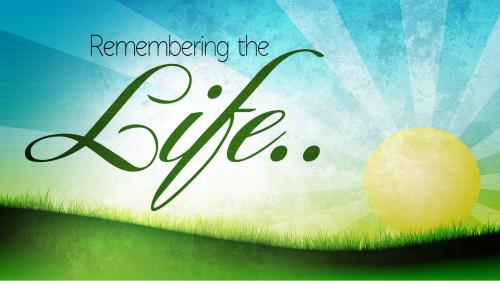-
Jacob’s Funeral
Contributed by Dr. Odell Belger on Apr 5, 2022 (message contributor)
Summary: The last thing we can do for those we love when they die is to carry out all of their wishes for their funeral.
Illus: Many times when a person plans for their funeral, they want to:
• Select certain songs they want sung
• Select certain passages of scriptures they want read
• Select a pastor and a church building where they want their funeral to be held
And when they die, the family does everything they can to carry out those wishes.
This is what Joseph and his brother did, in Genesis chapter 50, concerning their father’s death. In Genesis 50:1-13, Jacob’s burial wishes were honored. To carry out Jacob’s last wishes, they had to leave Egypt and go back to Canaan where Jacob wished to be buried.
We see . . .
I. THEIR LEAVING
This is one of the most detailed accounts of a burial in Scriptures. Notice how carefully Joseph saw that his father’s burial instructions were carried out. The moment Jacob died, Joseph leaned over his father’s face and wept over him and kissed him. Look at Genesis 50:1, we read, “And Joseph fell upon his father’s face, and wept upon him, and kissed him.”
This shows the great love and tenderness of Joseph for his father. Jacob by no means had lived a perfect life. But Joseph loved his father despite his past failings.
Joseph saw that his father was buried according to custom of that time. Notice Joseph had his own physicians embalm his father. Look at verse 2, we read, “And Joseph commanded his servants the physicians to embalm his father: and the physicians embalmed Israel.”
Notice, the embalming took forty full days. Look at Genesis 50:3, we read, “And forty days were fulfilled for him; for so are fulfilled the days of those which are embalmed: and the Egyptians mourned for him threescore and ten days.”
I like this custom among the Egyptians. The Bible says they, “Mourned for him threescore and ten days.” (Forty days) Today, when we attend a funeral service we see people laughing, passing out business cards, talking sports and politics. Then they have a big meal and pass the potato salad and go home as if this person never existed.
Yes, I like this Egyptian custom of having a long period of mourning over the death of a loved one.
Now evidently embalming was not done for everyone in those days.
Illus: Bill Shives, of Shives Funeral home, was dealing with a family that just had a death. The woman whose husband died stated she did not want her husband to be embalmed but to remain at the funeral home for a couple of days. But Bill, in his very tactful way, said “We can do that, but when the body begins to become odorous, we will have to bring him to your house.”
Today, it is customary for all bodies to be embalmed. But evidently this was not the case during this time for the Egyptians. For the Egyptians, embalming was customary preparation of dignitaries for burial.
The Bible tells us that Joseph got his personal physician to take care of his father’s embalming.
The embalming was necessary for Jacob’s burial because he was going to be carried back to Canaan, which was between 250 to 300 miles away. This would take many weeks of traveling to the cave Machpelah where Jacob was to be laid to rest.
Perhaps the same logistical problem (without the availability of embalmers) forced Jacob to bury Rachel along the way rather than to transport her body to the cave of Machpelah in Genesis 35:16-20.
But before they could take Jacob to Canaan, they had to get permission to leave. Look at Genesis 50:4-5, we read, “And when the days of his mourning were past, Joseph spake unto the house of Pharaoh, saying, If now I have found grace in your eyes, speak, I pray you, in the ears of Pharaoh, saying, My father made me swear, saying, Lo, I die: in my grave which I have digged for me in the land of Canaan, there shalt thou bury me. Now therefore let me go up, I pray thee, and bury my father, and I will come again.”
Why didn’t Joseph make the request himself? There are two reasons:
(1) This may be due to some kind of ceremonial defilement that would make Joseph’s personal appearance and appeal offensive to Pharaoh.
(2) This was to assure that Pharaoh would not take offense to Jacob’s burial in Canaan rather than Egypt.
Without reservation, Joseph’s request was granted. This probably seems like a reasonable request, because many when they die like to be carried to their homeland to be buried.
By having other of?cials present, the request would assure Pharaoh that Joseph was not secretly plotting to leave Egypt but would return after the funeral.
Note that Joseph actually told Pharaoh that he would return to Egypt. Look again at verse 5, we read, “My father made me swear, saying, Lo, I die: in my grave which I have digged for me in the land of Canaan, there shalt thou bury me. Now therefore let me go up, I pray thee, and bury my father, and I WILL COME AGAIN.”

 Sermon Central
Sermon Central



